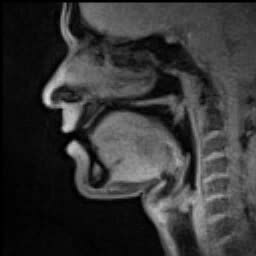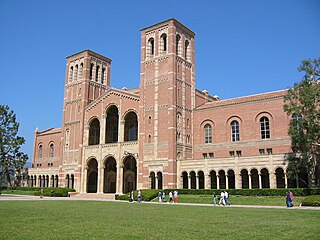Related Research Articles
A communication disorder is any disorder that affects an individual's ability to comprehend,detect,or apply language and speech to engage in dialogue effectively with others. The delays and disorders can range from simple sound substitution to the inability to understand or use one's native language.
Specific language impairment (SLI) is diagnosed when a child's language does not develop normally and the difficulties cannot be accounted for by generally slow development,physical abnormality of the speech apparatus,autism spectrum disorder,apraxia,acquired brain damage or hearing loss. Twin studies have shown that it is under genetic influence. Although language impairment can result from a single-gene mutation,this is unusual. More commonly SLI results from the combined influence of multiple genetic variants,each of which is found in the general population,as well as environmental influences.

Speech is human vocal communication using language. Each language uses phonetic combinations of vowel and consonant sounds that form the sound of its words,and using those words in their semantic character as words in the lexicon of a language according to the syntactic constraints that govern lexical words' function in a sentence. In speaking,speakers perform many different intentional speech acts,e.g.,informing,declaring,asking,persuading,directing,and can use enunciation,intonation,degrees of loudness,tempo,and other non-representational or paralinguistic aspects of vocalization to convey meaning. In their speech speakers also unintentionally communicate many aspects of their social position such as sex,age,place of origin,physical states,psychological states,physico-psychological states,education or experience,and the like.
Language disorders or language impairments are disorders that involve the processing of linguistic information. Problems that may be experienced can involve grammar,semantics (meaning),or other aspects of language. These problems may be receptive,expressive,or a combination of both. Examples include specific language impairment,better defined as developmental language disorder,or DLD,and aphasia,among others. Language disorders can affect both spoken and written language,and can also affect sign language;typically,all forms of language will be impaired.
The American Speech–Language–Hearing Association (ASHA) is a professional association for speech–language pathologists,audiologists,and speech,language,and hearing scientists in the United States and internationally. It has more than 218,000 members and affiliates.

Speech–language pathology is a field of expertise practiced by a clinician known as a speech–language pathologist (SLP) or a speech and language therapist,both of whom may be referred to as a speech therapist. Speech–language pathology is considered a "related health profession" or "allied health profession",along with audiology,optometry,occupational therapy,rehabilitation psychology,physical therapy and others.
Auditory processing disorder (APD),rarely known as King-Kopetzky syndrome or auditory disability with normal hearing (ADN),is a neurodevelopmental disorder affecting the way the brain processes auditory information. Individuals with APD usually have normal structure and function of the outer,middle,and inner ear. However,they cannot process the information they hear in the same way as others do,which leads to difficulties in recognizing and interpreting sounds,especially the sounds composing speech. It is thought that these difficulties arise from dysfunction in the central nervous system. It is highly prevalent in individuals with other neurodevelopmental disorders,such as Attention Deficit Hyperactivity Disorder,Autism Spectrum Disorders,Dyslexia,and Sensory Processing Disorder.
Eleanor M. Saffran,an American neuroscientist,was a researcher in the field of Cognitive Neuropsychology. Her interest in Neuropsychology began at the Baltimore City hospitals of Johns Hopkins University,where her research unit focused on neurological patients with language or cognitive impairments. In papers published between 1976 and 1982,Dr. Saffran spelled out the methodological tenets of “cognitive neuropsychology”exemplified in her studies of aphasia,alexia,auditory verbal agnosia,and short-term memory impairment.
Speech and language impairment are basic categories that might be drawn in issues of communication involve hearing,speech,language,and fluency.

Developmental verbal dyspraxia (DVD),also known as childhood apraxia of speech (CAS) and developmental apraxia of speech (DAS),is a condition in which children have problems saying sounds,syllables and words. This is not because of muscle weakness or paralysis. The brain has problems planning to move the body parts needed for speech. The child knows what they want to say,but their brain has difficulty coordinating the muscle movements necessary to say those words.
A late talker is a toddler experiencing late language emergence (LLE),which can also be an early or secondary sign of an autism spectrum disorder,or other developmental disorders,such as fetal alcohol spectrum disorder,attention deficit hyperactivity disorder,intellectual disability,learning disability,social communication disorder,or specific language impairment. Late talkers are children who are not intellectually disabled,but do not show signs of normal language development for their age. Lack of language development,comprehension skills,and challenges with literacy skills are potential risks as late talkers age. Outlook for late talkers with or without intervention is generally favorable. Toddlers have a high probability of catching up to typical toddlers if early language interventions are put in place. Language interventions include general language stimulation,focused language stimulation and milieu teaching.
Developmental language disorder (DLD) is identified when a child has problems with language development that continue into school age and beyond. The language problems have a significant impact on everyday social interactions or educational progress,and occur in the absence of autism spectrum disorder,intellectual disability or a known biomedical condition. The most obvious problems are difficulties in using words and sentences to express meanings,but for many children,understanding of language is also a challenge. This may not be evident unless the child is given a formal assessment.
Susan Ellis Weismer is a language and communication scientist known for her work on language development in children with specific language impairment and autism spectrum disorder (ASD). She is the Oros Family Chair and Professor of Communication Sciences and Disorders at the University of Wisconsin–Madison,where she is a Principal Investigator and Director of the Language Processes Lab. She has also served as the Associate Dean for Research,College of Letters and Sciences at the University of Wisconsin–Madison.
James Bruce Tomblin is a language and communication scientist and an expert on the epidemiology and genetics of developmental language disorders (DLD). He holds the position of Professor Emeritus of Communication Sciences and Disorders at the University of Iowa.
Marilyn Adrienne Nippold is language and communications scientist with expertise in adolescent language development and disorders. She is Professor in Communication Disorders and Sciences at the University of Oregon. Nippold is author of several books on adolescent language development,including Later Language Development:The School-age and Adolescent Years and Language Sampling with Adolescents:Implications for Intervention.
Johanne Catherine Paradis is a language scientist and expert on bilingual language development. She is Professor of Linguistics and Adjunct Professor of Communication Sciences and Disorders at the University of Alberta,where she directs the Language Acquisition Lab and the Child English Second Language (CHESL) Center.
Laura M. Justice is a language scientist and expert on interventions to promote children's literacy. She is the EHE Distinguished Professor of Educational Psychology at Ohio State University,where she also serves as the Executive Director of the A. Sophie Rogers School for Early Learning.
Janna Beth Oetting is a researcher and speech-language pathologist specializing in the cross-dialectal study of childhood language development and developmental language disorders.

Susan Curtiss is an American linguist. She is Professor Emerita at the University of California,Los Angeles. Curtiss' main fields of research are psycholinguistics and neurolinguistics. Her 1976 UCLA PhD dissertation centered on the study of the grammatical development of Genie,a famous feral child. Her subsequent work has been on grammatical development in children with SLI;maturational constraints on first-language development;hemispheric specialization for language and language acquisition;and the cognitive modularity of grammar.

Judith Ann Cooper is an American speech pathologist serving as the deputy director of the National Institute on Deafness and Other Communication Disorders (NIDCD). She was the acting director of the NIDCD from June 2018 to August 2019. Cooper is an elected fellow of the American Speech–Language–Hearing Association.
References
- ↑ "Elena Plante". The University of Arizona: Speech, Language & Hearing Sciences. Retrieved 20 October 2019.
- ↑ "Elena Plante, Professor, Speech, Language, and Hearing, University of Arizona". www.u.arizona.edu. Retrieved 2019-10-29.
- ↑ "Faculty | Cognitive Science". www.cogsci.arizona.edu. Retrieved 2019-10-29.
- ↑ "UA SLHS Professor Elena Plante Awarded Highest Honors of the Association | Speech, Language, and Hearing Sciences". slhs.arizona.edu. Retrieved 2019-10-29.
- ↑ Plante, Elena, 1961- (2013). Communication and communication disorders : a clinical introduction. Beeson, Pelagie M. (4th ed.). Boston, Mass.: Pearson. ISBN 9780132658126. OCLC 795687170.
{{cite book}}: CS1 maint: multiple names: authors list (link) - ↑ Boone, Daniel R.; Plante, Elena (1993). Human communication and its disorders (2nd ed.). Englewood Cliffs, N.J.: Prentice Hall. ISBN 0134440765. OCLC 25632170.
- ↑ Congress, The Library of. "LC Linked Data Service: Authorities and Vocabularies (Library of Congress)". id.loc.gov. Retrieved 2019-10-29.
- ↑ Rasmussen, Frederick N. "Kenneth L. Plante, electrical engineer and community volunteer, dies" . Retrieved 20 October 2019.
- ↑ "Mr. Kenneth Louis Plante Obituary".
- ↑ "Name change another step in Loyola's evolution". Archdiocese of Baltimore. 19 January 2012.
- ↑ "Elena Plante, Professor, Speech, Language, and Hearing, University of Arizona". www.u.arizona.edu. Retrieved 2019-10-28.
- ↑ "Academic CV | Plante Lab". plante.lab.arizona.edu. Retrieved 2019-11-04.
- ↑ Administrator, Who's Who Site (2019-03-12). "Anna I.S. Binkiewicz". Who's Who Lifetime Achievement. Retrieved 2019-10-29.
- ↑ Plante, Elena Margaret (1990). "Cerebral configurations among the parents and siblings of language-disordered boys".
{{cite journal}}: Cite journal requires|journal=(help) - ↑ "Elena Plante, Professor, Speech, Language, and Hearing, University of Arizona". www.u.arizona.edu. Retrieved 2019-10-29.
- ↑ "Talk MOORE Summer Camp for Preschoolers | Speech, Language, and Hearing Sciences". slhs.arizona.edu. Retrieved 2019-10-29.
- ↑ Tricoles, Robin; Communications, University Relations- (23 May 2016). "UA Speech Camp Helps Kids and Researchers". UANews. Retrieved 2019-10-29.
- ↑ "Grantome" . Retrieved 4 November 2019.
- ↑ "2018 Board of Directors Election Results". American Speech-Language-Hearing Association. Retrieved 2019-10-29.
- ↑ "Elena Plante Elected to ASHA Board of Directors | Speech, Language, and Hearing Sciences". slhs.arizona.edu. Retrieved 2019-10-29.
- ↑ "Brookes Publishing: Test of Integrated Language and Literacy Skills™ (TILLS™) Examiner's Kit". products.brookespublishing.com. Retrieved 2019-11-11.
- ↑ "Brookes Publishing: Pediatric Test of Brain Injury™ (PTBI™ )". products.brookespublishing.com.
- ↑ Hotz, Gillian; Helm-Estabrooks, Nancy; Nelson, Nickola; Plante, Elena (2010). Pediatric test of brain injury. Baltimore: Brookes Pub. Co. ISBN 978-1598571127. OCLC 476157105.
- ↑ "Editor's Awards | | ASHA Publication Websites". pubs.asha.org. Retrieved 2019-11-11.
- ↑ Spaulding, Tammie J.; Plante, Elena; Farinella, Kimberly A. (2006). "Eligibility Criteria for Language Impairment: Is the Low End of Normal Always Appropriate?". Language, Speech, and Hearing Services in Schools. 37 (1): 61–72. doi:10.1044/0161-1461(2006/007). ISSN 0161-1461. PMID 16615750.
- ↑ von Koss Torkildsen Janne; Dailey Natalie S.; Aguilar Jessica M.; Gómez Rebecca; Plante Elena (2013-04-01). "Exemplar Variability Facilitates Rapid Learning of an Otherwise Unlearnable Grammar by Individuals With Language-Based Learning Disability". Journal of Speech, Language, and Hearing Research. 56 (2): 618–629. doi:10.1044/1092-4388(2012/11-0125). PMC 3973537 . PMID 22988285.
- ↑ Gómez, Rebecca L. (2002). "Variability and Detection of Invariant Structure". Psychological Science. 13 (5): 431–436. doi:10.1111/1467-9280.00476. ISSN 0956-7976. PMID 12219809. S2CID 9058661.
- ↑ "Editor's Awards | | ASHA Publication Websites". pubs.asha.org. Retrieved 2019-11-11.
- ↑ Meyers-Denman Christina N.; Plante Elena (2016-10-01). "Dose Schedule and Enhanced Conversational Recast Treatment for Children With Specific Language Impairment". Language, Speech, and Hearing Services in Schools. 47 (4): 334–346. doi:10.1044/2016_LSHSS-15-0064. PMC 5345548 . PMID 27701629.